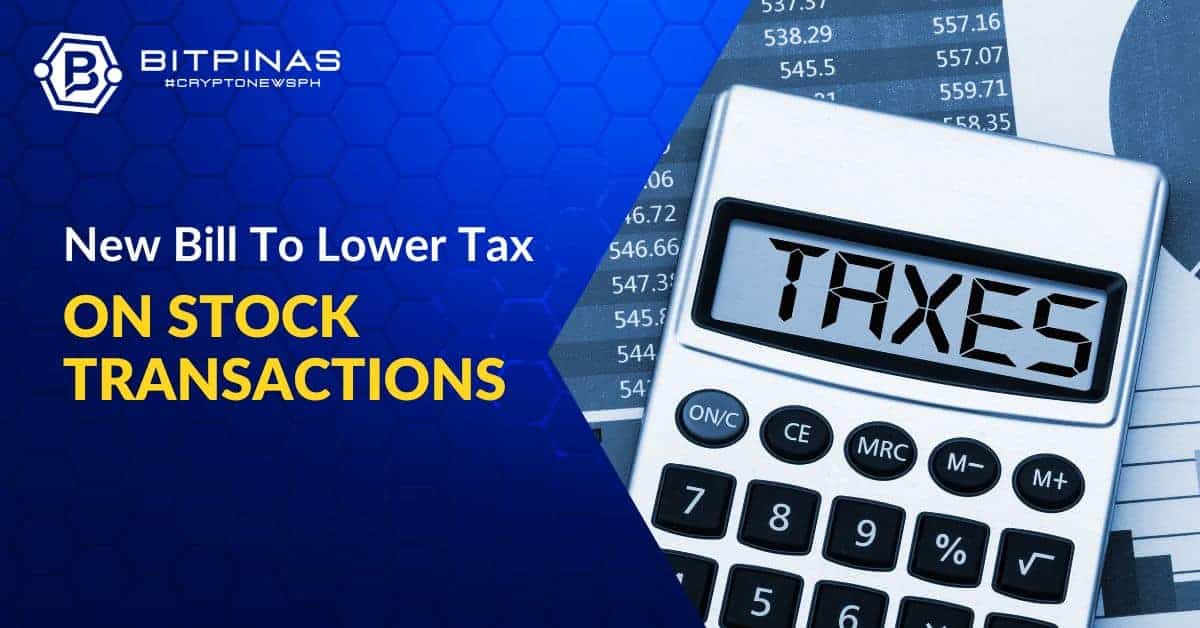Bill to Cut Stock Taxes Gains SEC Support
The SEC has shown its support to the proposed Capital Markets Efficiency Promotion Act, which seeks to reduce the stock transaction tax to 0.1% from 0.6%.

- The SEC has shown its support to the proposed Capital Markets Efficiency Promotion Act, which seeks to lower stock transaction taxes.
- The bill, filed by Rep. Joey Salceda, targets to reduce the STT to 0.1% of the stock value, lower than the current 0.6% rate.
- For Salceda, once the bill becomes law, it is expected to encourage more local and foreign investors to participate in the Philippine capital market.
Aiming to boost and improve the competitiveness of the country’s capital market, the Securities and Exchange Commission expressed its support on the current house bill that seeks to reduce the tax on stock transactions.
Capital Markets Efficiency Promotion Act
On August 23, 2023, Albay Second District Representative Joey Salceda introduced House Bill No. 8958, also known as the proposed Capital Markets Efficiency Promotion Act. This bill seeks to lower stock transaction taxes (STT) to “attract more investors into the market.”
A month later, the bill went to deliberations at the committee level and was substituted by House Bill No. 9277.
Basically, this bill targets to reduce the STT to 0.1% of the stock value, lower than the current 0.6% rate. It also aims to reduce the tax on dividends for foreign nonresidents to 10%, much lower than the current 25%.
This initiative, once signed into law, will encourage more local and foreign investors to participate in the Philippine capital market, according to Salceda.
SEC on Stock Trading in PH
In a statement, the Commission highlighted its efforts to encourage more investors into the capital market, including supporting the Capital Markets Efficiency Promotion Act.
“The SEC welcomes the efforts of our legislators to boost the capital market, as this recognizes the contribution and potential of the financial sector to help in the development of the Philippine economy, toward easing and improving the lives of all Filipinos.”
Emilio Aquino, Chairperson, SEC
lawmakers so “new laws and policies will be reflective of the needs and demands of the market and investors, while still balancing the Commission’s role as regulator.”
Recently, the regulatory agency amended the 2015 Implementing Rules and Regulations of Republic Act No. 8799, also known as the Securities Regulation Code, through SEC Memorandum Circular No. 11, Series of 2023. The amendment orders a cut in the settlement cycle to two days after the trade date, one day shorter than the current three-day cycle.
“Funding portals have also been empowered by the Commission to act as registrars of qualified institutional and individual buyers, which eliminates the need for these portals to use third party institutions to assist potential investors with their applications as qualified buyers.”
Securities and Exchange Commission
In June this year, BitPinas reported that the SEC approved short selling in the stock market in the country. It was then followed by the confirmation of the Philippine Stock Exchange (PSE) that it is making preparations to introduce the long-awaited concept of “short selling” in the local equities market.
Read: PSE Limits Short Selling to Top 30 Stocks
Then, just last month, the regulatory agency also gave the green light to e-wallet GCash to publicly launch its in-app stocks trading, GStocks. This allowed GCash’s 80 million users to buy and sell shares from companies listed on the PSE, monitor their portfolios, and access a stock watch list and analytics tools.
Salceda’s Recent Financial Affairs Initiative
As the chairman of the lower house’s Committee on Ways and Means, Salceda recently gave statements relating to financial affairs in the country. The committee has jurisdiction over matters relating to the fiscal and monetary affairs of the national government.
Earlier this year, Salceda demanded the Bank of the Philippines Islands (BPI) to compensate or reimburse customers who were affected by a double debit glitch that resulted in fund deductions. This occurred after some BPI users experienced double debits for transactions between December 30 and December 31, 2022.
The lawmaker also wrote to the Bangko Sentral ng Pilipinas, asking the central bank to impose a cap on late credit fees that financial institutions issue to customers who fail to pay or meet the minimum payment of the bill due date, citing that the accumulation of debts like this is dangerous for the country’s economy and for consumers.
Salceda also expressed his plans to create a working group that would study the possibility of taxing digital assets when he refiled the Digital Economy Value Added Tax (VAT) Law last year.
This article is published on BitPinas: Bill to Cut Stock Taxes Gains SEC Support
Disclaimer:
- Before investing in any cryptocurrency, it is essential that you carry out your own due diligence and seek appropriate professional advice about your specific position before making any financial decisions.
- BitPinas provides content for informational purposes only and does not constitute investment advice. Your actions are solely your own responsibility. This website is not responsible for any losses you may incur, nor will it claim attribution for your gains.





